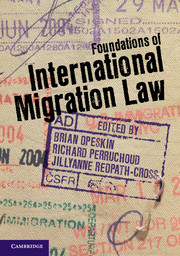Book contents
- Frontmatter
- Summary contents
- Detailed contents
- Preface
- List of case studies
- List of boxes
- List of figures
- List of maps
- List of tables
- Notes on contributors
- Abbreviations
- 1 Conceptualising international migration law
- 2 Contemporary patterns of international migration
- 3 Sources of international migration law
- 4 Nationality and statelessness
- 5 State sovereignty and freedom of movement
- 6 International human rights of migrants
- 7 Refugees and asylum
- 8 Women, children and other marginalised migrant groups
- 9 Human trafficking and smuggling
- 10 International migration by sea and air
- 11 International labour migration
- 12 International trade law and labour mobility
- 13 Global migration institutions and processes
- 14 Regional processes, law and institutional developments on migration
- 15 Emerging legal issues in international migration
- Appendix 1 Cases
- Appendix 2 Treaties and other international instruments
- Glossary
- Index
Preface
Published online by Cambridge University Press: 05 November 2012
- Frontmatter
- Summary contents
- Detailed contents
- Preface
- List of case studies
- List of boxes
- List of figures
- List of maps
- List of tables
- Notes on contributors
- Abbreviations
- 1 Conceptualising international migration law
- 2 Contemporary patterns of international migration
- 3 Sources of international migration law
- 4 Nationality and statelessness
- 5 State sovereignty and freedom of movement
- 6 International human rights of migrants
- 7 Refugees and asylum
- 8 Women, children and other marginalised migrant groups
- 9 Human trafficking and smuggling
- 10 International migration by sea and air
- 11 International labour migration
- 12 International trade law and labour mobility
- 13 Global migration institutions and processes
- 14 Regional processes, law and institutional developments on migration
- 15 Emerging legal issues in international migration
- Appendix 1 Cases
- Appendix 2 Treaties and other international instruments
- Glossary
- Index
Summary
Preface
International migration has been a topic on the lips of policy makers for a very long time. The policy interests of States vary widely. Some seek to promote immigration to meet local labour shortages, or facilitate emigration to generate a stream of remittances and foster local development. Others take a more cautious approach because of concerns about irregular migration or national security, or because their societies historically have not welcomed foreigners. These different policy stances are reflected in a vast and complex array of national migration laws that span issues of nationality, entry, exit, deportation, detention, visa classes, status determination, migration-related crime and access to social services. These laws are generally well known within States because they are applied on a daily basis by immigration officials, consular officers, border patrols and crime investigators.
By contrast, the framework of international law governing migration is fragmented and unfamiliar. While some pockets are well recognised – refugee law being the principal example – many dimensions of the international legal framework remain unknown to all but a small coterie of specialists. Many individuals who formulate national migration laws, policies and practices, or are required to implement them, are thus unaware of the rich lode of international agreements, customary law, resolutions, recommendations and guidelines informing developments at the national level.
- Type
- Chapter
- Information
- Foundations of International Migration Law , pp. xi - xiiiPublisher: Cambridge University PressPrint publication year: 2012



